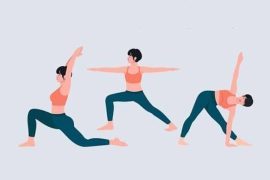Outdoor exercise provides a wealth of physical and mental health benefits, from improved focus to enhanced performance. According to Brianna Bernard, a certified personal trainer, clients often exhibit more presence and concentration during outdoor workouts, leading them to train harder compared to indoor sessions. Engaging in activities like running, paddling, or hiking not only boosts physical fitness but also promotes mental well-being, reducing stress and increasing mood.
Outdoor workouts offer variety, helping break the monotony of indoor routines, and can improve cardiovascular health, build strength, and increase endurance. Starting outdoor exercise is easy with activities like jogging in a park or a nature hike, and the fresh air and natural surroundings provide added motivation to stay active.
Outdoor exercise offers a range of physical and mental health benefits. Here’s a detailed summary of the advantages and tips for getting the most out of outdoor workouts:
Benefits of Outdoor Exercise
Stress and Anxiety Reduction:
- Exercising outdoors, especially in nature, helps reduce stress and anxiety. Studies show that walking in natural environments lowers cortisol levels (stress hormone) more than indoor activities, promoting relaxation and improved mood.
- Nature provides a therapeutic effect, allowing people to disconnect from everyday stressors, leaving them refreshed and rejuvenated.
Increased Exercise Duration:
- People tend to exercise for longer periods when outdoors, driven by the enjoyment of fresh air, nature, and scenic surroundings. This effect is particularly noticeable in older adults.
Improved Sleep Quality:
- Exercising outside, especially in natural light, helps regulate circadian rhythms, improving sleep quality. Exposure to sunlight during outdoor workouts is beneficial for sleep, although more research is needed to quantify the exact benefits.
Boosted Vitamin D Levels:
- Vitamin D, essential for bone health, immune function, and overall well-being, is naturally synthesized when the skin is exposed to sunlight. Exercising outdoors in the sun enhances vitamin D production, but it’s important to wear sunscreen to protect skin while still benefiting from sunlight.
Improved Self-Esteem:
- Physical activity in nature can improve self-esteem, reduce depression, and alleviate anger and tension. Just five minutes of outdoor exercise can trigger these mental health benefits.
Enhanced Memory and Focus:
- Outdoor exercise can improve memory and attention. A 15-minute walk outside can boost blood flow to the brain, particularly the prefrontal cortex, which is involved in problem-solving and emotions. The natural setting helps minimize distractions, allowing the brain to recover from mental fatigue and improve focus.
Reduced Chronic Disease Risk:
- Studies show that spending more time outdoors leads to more moderate-to-vigorous physical activity, which is linked to a lower risk of chronic diseases such as heart disease, diabetes, and high blood pressure.
Best Outdoor Workouts
There are many outdoor activities to choose from, including:
- Walking, Running, and Hiking: Easy and effective for cardiovascular health.
- Cycling and Trail Running: Great for endurance and leg strength.
- Resistance Training: Using portable equipment or bodyweight exercises like push-ups, squats, and lunges.
- Outdoor Sports: Tennis, soccer, basketball, volleyball, pickleball, and even swimming.
- Water Sports: Canoeing, kayaking, paddleboarding, and surfing.
- Winter Sports: Snowshoeing, skiing, snowboarding, and ice skating.
- Mind-Body Practices: Yoga, Tai Chi, and Pilates outdoors.
- Climbing: Rock climbing for strength and agility.
Tips for Getting Started with Outdoor Exercise
- Wear Proper Gear: Dress in layers for cold weather to stay warm and dry. In hot weather, wear breathable, moisture-wicking fabrics. Choose shoes with good traction if exercising on uneven terrain.
- Protect Against Sun Exposure: Apply sunscreen (SPF 30 or higher), wear UPF-protective clothing, and sunglasses. Try to avoid exercising during peak sunlight hours (10 a.m. to 4 p.m.).
- Monitor the Weather: Always check weather conditions before heading outside. Avoid exercising outdoors during extreme heat, cold, or hazardous conditions like lightning, poor air quality, or heavy rain.
- Participate in Group Activities: Exercising outdoors is a social activity, which can help increase motivation. Join outdoor exercise classes, hiking groups, or team sports for accountability and social interaction.
- Stay Hydrated: Drink water regularly, especially if exercising in hot weather or for longer periods. For workouts lasting more than an hour, consider electrolyte-replenishing drinks.
Outdoor exercise offers numerous physical, mental, and emotional benefits, from improved mood and reduced stress to enhanced cognitive function and better physical health. By following proper precautions, such as wearing the right clothing, protecting your skin from the sun, and staying hydrated, you can enjoy all these benefits while staying safe and comfortable. Whether walking, running, cycling, or engaging in outdoor sports, the fresh air and natural surroundings provide a rejuvenating and effective alternative to indoor workouts.
Disclaimer:
The information contained in this article is for educational and informational purposes only and is not intended as a health advice. We would ask you to consult a qualified professional or medical expert to gain additional knowledge before you choose to consume any product or perform any exercise.








